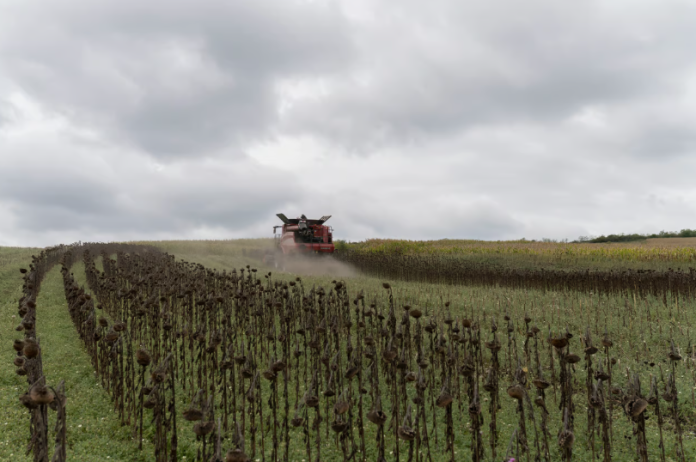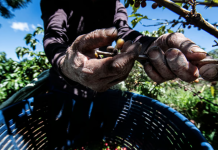
Bucharest’s emergency approvals for banned insecticides pit its sunflower sector against EU law — and expose weaknesses in Brussels’ enforcement.
BRUSSELS — Romania has kicked off 2025 by openly defying European Union law, granting fresh emergency approvals for banned bee-killing pesticides despite a court ruling that such derogations are illegal.
In its latest move, the country’s ministry of agriculture has quietly greenlit the use of Cruiser 350 FS — a neonicotinoid insecticide banned in the EU due to its devastating impact on pollinators.
This decision directly challenges the landmark January 2023 Court of Justice of the European Union ruling that prohibits such derogations, exposing a growing rift between Bucharest and EU authorities over environmental compliance.
Bucharest has authorized the use of Cruiser 350 FS for maize and sunflower crops in 2025, along with a slew of other banned chemicals, citing severe pest infestations and economic pressures. The defiance raises questions over Romania’s interpretation of EU law and highlights the European Commission’s struggle to enforce its rules.
Farmers on the front lines
Romania’s sunflower sector — one of the largest in Europe — is the cornerstone of its agricultural economy.
Farmers in southern and southeastern Romania, where sunflowers and maize dominate the landscape, face significant threats from soil pests like the maize leaf weevil (Tanymecus dilaticollis) and wireworms (Agriotes spp.). These pests can devastate early-stage crops, forcing costly reseeding and slashing yields in monoculture fields.
Without treatments like neonicotinoids, farmers warn of total crop losses in some affected areas. The ministry of agriculture cited these risks in its decision, stating that treated seeds will be limited to areas with severe pest infestations and strict controls will minimize environmental risks.
But neonicotinoids —or neonics — are also widely recognized for their harm to pollinators, with studies linking their use to declines in bee populations and broader biodiversity loss. This is why the EU banned Cruiser 350 FS and other neonics from outdoor use in 2018.
The CJEU’s 2023 ruling was meant to close loopholes allowing Romania and other member countries to routinely bypass these bans. Countries like France and Belgium, among the EU’s heaviest users of neonicotinoids, quickly complied. Yet Romania has continued to authorize their emergency use in 2023, 2024 — and now 2025.
The European Commission told POLITICO that it has not yet received formal notification of Romania’s latest derogations. However, spokesperson Eva Hrncirova confirmed the issue is under discussion within the Standing Committee on Plants, Animals, Food and Feed — a Commission-led panel bringing together representatives from national ministries that consults on practical policy implementation.
Hrncirova emphasized the Commission’s commitment to working closely with Romania but stopped short of indicating whether infringement proceedings might follow.
Buzzkill for bees
Beekeepers in Romania are among the most vocal critics of neonicotinoid use and have repeatedly appealed to the EU authorities to act.
They warn that the continued use of these banned pesticides is pushing many beekeeping operations to the brink of collapse. With widespread colony losses, recovery efforts are increasingly futile, as years of exposure to neonicotinoids leave hives too weakened to rebuild. Beyond the economic toll, beekeepers argue that diminished pollinator populations threaten entire ecosystems and food security.
Despite these concerns, Romania’s agriculture ministry defended its decision, arguing that the derogations were both necessary and legal.
In a response to POLITICO, the ministry cited the lack of viable alternatives for managing severe pest infestations and claimed that EU pesticide rules allow emergency authorizations in “special circumstances.” It argued that this approach protects the competitiveness of Romanian agriculture while addressing plant health threats that cannot be resolved by other means. The ministry also maintained that the actions comply with EU law, even in light of the CJEU ruling, which it interpreted as permitting such derogations under certain conditions.
Romania’s defiance also comes amid political instability. The country recently faced upheaval after far-right candidate Călin Georgescu, running on a nationalist, anti-EU platform, advanced in presidential elections, only for the results to be annulled amid allegations of Russian interference.
Brussels’ reluctance to act stems partly from fears of alienating Eastern European member countries increasingly resistant to the bloc’s sustainability targets. The situation reflects a growing tension between economic realities and the EU’s push for greener policies, particularly in regions more reliant on agriculture.
Critics argue that Brussels’ inaction signals to member countries that economic priorities can trump environmental law.
“This sets a dangerous precedent,” said Martin Dermine of PAN Europe, an NGO advocating against pesticide use.
If Bucharest goes unpunished, he said, it could trigger a domino effect of defiance across the bloc, threatening the EU’s credibility in upholding environmental commitments.
This story has been updated with Romanian government comment.





















